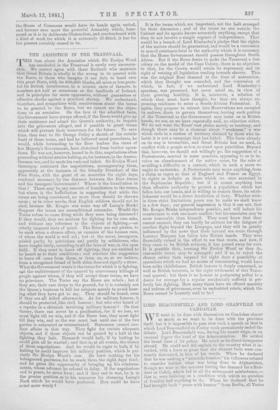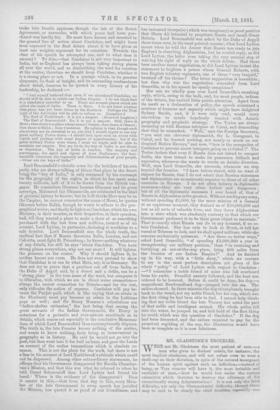LORD BEACONSFIELD AND LORD GRANVILLE ON CANDAHAR.
E want to 'be done with discussions on Candahar almost
as much as we want to be done with the province itself, but it is impossible to pass over such a speech as that in which Lord Beaconsfield on Friday week prematurely ended the debate. Lord Beaconsfield was, during his recent reign, in an unusual degree the head of the Administration. He settled the broad lines of its policy. He acted as its direct interpreter abroad. He could and did explain to the country what it in- tended, with a force so great that the clearest facts were con- stantly distrusted, in face of his words. When he declared that he was seeking a " seientific frontier," his followers refused to consider further what was being done in Afghanistan, though we were at the moment forcing the demand for a Resi- dent at Cabul, which led to all the subsequent misfortunes,— that is, were insisting on a condition with which no question of frontier had 'anything to do. When he declared that lie had brought back " peace with honour" from Berlin, all Tories broke into frantic applause, though the ink of the Secret Agreement, or surrender, with which peace had been pur- chased was hardly dry. He must have known and assented to the general line of action about Candahar, and might have been expected in the final debate about it to have given at least one weighty argument for its retention. Towards the close of his speech he attempted one, and to what does it amount ? To this,—that Candahar is not very important to India, but as England has always been taking strong places all over the world, and so diminishing the need for exertion at the centre, therefore we should keep Candahar, whether it is a strong place or not. In a passage which, in its genuine eloquence, its flash of insight, and its astounding confusedness about detail, deserves to be quoted in every history of his leadership, he declared :— " I had myself believed that oven if wo abandoned Candahar, we should still be able to retain our Indian Empire. I do not think that it is absolutely essential to us. There are several places which are called the keys of India. There is Merv. I do not know whether that place has yet been taken by the Russians. Perhaps the First Lord of the Admiralty will be able to inform us. (Laughter)
The Earl of Northbrook : It is not a seaport. (Renewed laughter.) The Earl of Beaconsfield: No, it is not a seaport. Still, there is Mery ; then there is a place whose name I forget ; then there is Ghazni ; then there is Balkh ; then (.1andahar. My opinion is that, though such places may not be oshontial to us, yet that I should regret to see any great military Power there,—I should look upon such an event with regret, and perhaps with some degree of apprehension ; but if the great military Power were there, I trust we might still be able to maintain our empire. But, my lords, the key of India is not Herat or Oandalutr, The key of India is London. The majesty Cind sovereignty, the spirit and vigour of your Parliament, the inex- haustible resources, the ingenuity and determination of your people, —these are the keys of India."
Lord Beaconsfield's vitriolic scorn for the babblers of his own party, who are always talking of this or that place in the desert being the "key of India," is only surpassed by his contempt for the geography of the region in which he has spent some twenty millions, half of it to be drawn from the British tax- payer. He remembers Ghnznce because Ghuznee and its great sovereign, Mahraoud the Ghuznavide, are celebrated in the kind of pictorial history he knows ; but he half thinks Mery may be on the Caspian, he cannot remember the name of Herat, he quotes Ghuznee before Balkh, though he wants to adhere to the geo- graphical series; and finally he lights on Candahar, which his own Ministry, in their treaties, in their despatches, in their speeches, had, till they wanted a place to make a show of as something purchased with the lost lives and millions, treated as of no account, Lord Lytton, in particular, declaring it worthless to a safe frontier. Lord Beaconsfield sees the whole truth, the cardinal fact that if Russia threatens India, London, and not Calcutta, must fight St. Petersburg ; he knows nothing whatever of any details, but still he says retain Candahar. You have strong places everywhere, why not one more ? It will lighten the pressure on the centre.' Why it should lighten it, he neither knows nor cares. He does not even pretend to show that Candahar is or can be what Metz, say, is to Germany. He does not try to prove that a province cut off from India, as the Duke of Argyll said, by a desert and a defile, can be a "strong place "in the true sense of the word, but compares it to Gibraltar, with which we are in direct water connection— always the easiest connection for Britain—and for the rest, only ridicules the notion of expense. Candahar will pay be- cause the Punjab paid, which is like saying that an estate in the Shetlands must pay because an estate in the Lothians pays so well ; and Sir Henry Norman's calculations are "helter-skelter estimates," the fact being that among the great servants of the Indian Government, Sir Henry is notorious for a pedantic and over-minute exactitude as to details, which comes out especially in the conclusive Memoran- dum of which Lord Beaconsfield thus contemptuously disposes. Tho truth is, the late Premier knows nothing of the matter, and wants to know nothing, facts being as inconvenient in geography as in history. He said he would not go into the past, but then went into it for half an hour, and gave the Lords an account of the earlier transactions which is absolute ro- mance. This is not the place for the work, but there is not a line in his account of Lord Northbrook's attitude whioh could not be disproved. Among other extraordinary statements, he affirms that his Government disapproved Sir Neville Chamber- lain's Mission, and that this was what he referred to when he told Count Schouvaloff that Lord Lytton had forced his hand. Where is the evidence of the disapproval ? Does it consist in this,—tbat from that day to this,,every Mem- ber of the late Government in every speech has justified the Mission, has quoted it as proof of our friendliness, and has instanced its repulse (which was imaginary) as proof positive that Shere Ali intended to propitiate Russia and insult Great Britain. Lord Beaconsfield was asked by the Duke of Argyll three times over, in the most pointed manner, what Lord Lytton meant when he told the Ameer that Russia was ready to join England in absorbing Afghanistan, but he evaded reply, as did Lord Lytton, the latter even taking the very unusual step of waiving his right of reply on the whole debate. Had there been another secret negotiation, or did Lord Lytton invent the statement to frighten a prince whom General Roberts, with two English infantry regiments, one of them "very languid," brushed off his throne ? The latter supposition is incredible ; but then why was the negotiation concealed from Lord Granville, as in his speech he openly complains ? Nor can we wholly pass over Lord Granville's smashing reply, which, owing to the bulk, and, for most people, tedium of the debate, has excited little public attention. Apart from its merit as a declaration of policy, the speech contained a mixture of humour and sagacity which might have delighted Sydney Smith, and, if it were only read, would carry conviction to minds hopelessly wearied with Asiatic geography and prophetic strategy. The Tories are always menacing us with Russian intrigues at Cabul, and demanding that they be unmasked. "Well," says the Foreign Secretary, "you sent our cleverest diplomatist, Sir L. Cavagnari, to Cabal, and ho learned nothing, not nearly so much as our despised Native Envoys," and now, "how is the occupation of Candahar to prevent secret intrigues going on at Cabul ?" The Tories declare that even if Russia does not intend to conquer India, she does intend to make its possession difficult and expensive, whenever she wants to create an Asiatic diversion. Well, says Lord Granville, she succeeds, whenever we step beyond the frontier. "I have before stated, with no want of respect for Russia, that I do not admit that Russian statesmen and diplomatists are so eminently superior to those of all other countries in Europe. I do not often believe in diplomatic successes—they are very often hollow and dangerous ; but of all the diplomatic successes I ever heard of, that of Russia in Afghanistan is the greatest. Without sending any army, without spending £1,000, by the mere mission of a General at an opportune moment, they drained us of £20,000,000 and lost us all sorts of valuable lives, and they threw Afghanistan into a state which was absolutely contrary to that which our Government professed it to be their great object to maintain." That is exactly what Russia can do at any moment, if we re- tain Candahar. She has only to look at Herat, or tell her vassal at Teheran to look, and we shall spend millions, while she remains sardonically quiescent. " Are there no better ways," asked Lord Granville, "of spending £2,000,000 a year in strengthening our military position," than "in retaining and fortifying an out-of-the-way place, lying 400 miles from the frontier of our Indian Empire ?" And he finished up in his way, with a "little story," which we venture to say is the most perfect description yet given of the whole " policy " of Lord Lytton with respect to Candahar : —"I remember a noble friend of mine who fell overboard from his yacht. Dreadful anxiety followed, and the boat was ordered to be lowered. Before it could be done, his dog—a magnificent Newfoundland dog—jumped into the sea. The sailors cheered. In three minutes the dog triumphantly brought back to the vessel, not my noble friend, but his cap, which was the first thing he had been able to find. I cannot help think- ing that my noble friend the late Viceroy has noted the part of that noble and intelligent animal. His whole policy fell into the water, he jumped in, and laid hold of the first thing he could, which was the question of Candahar." If the dog had been decorated, and the sailors required to pay for the perpetual regilding of the cap, the illustration would have been as complete as it is now felicitous.



































 Previous page
Previous page